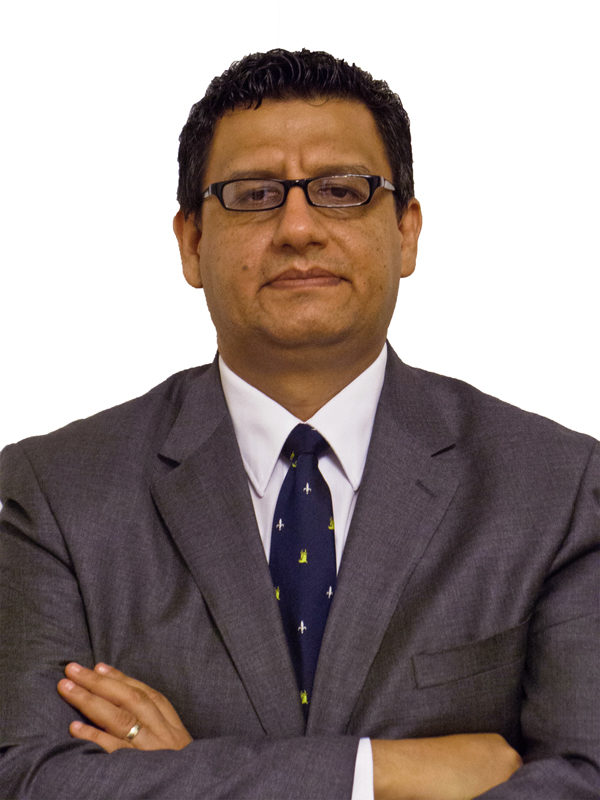Journalist in exile
Exiled journalist Luis Horacio Nájera on violence, Juárez, and leaving it all behind.
Even though he had already made the decision to flee Mexico many months before, Luis Horacio Nájera didn’t realize what he was leaving behind until the day he fled to live in exile in Canada. As his family was getting in the car, their lives packed into bags in the trunk, Nájera turned back to lock the door of their house in Ciudad Juárez.
“At that moment, I understood that I was leaving behind everything,” Nájera told the Committee to Protect Journalists, an organization that defends international press freedom. Nothing would ever be the same. Over four years later, he still looks back and wonders if he made the right decision.
Nájera has spent about 23 years working as a journalist. For nearly two decades he worked for Grupo Reforma, one of the largest publishing houses in Mexico. He covered Ciudad Juárez, located along the United States border, which, at the time, was one of the deadliest cities in the world.
“Not one of them,” Nájera clarifies. “From 2008 to 2010, it was the most.” He was followed, harassed, intimidated, and received many death threats because of his investigative work. Always the passionate journalist, Nájera was willing to cross the line into danger for the sake of a story.
But in 2008, a close source told Nájera that he was on a hit list of journalists who had been covering the area’s drug wars. In August of that year, he reported on a massacre at a drug rehabilitation centre that was being used to hide gang hitmen. He wrote in detail about the police’s role in concealing these criminals, along with other corrupt behaviour among state officials. By then, Nájera had published one too many articles exposing the government’s connection with drug cartels. With nowhere to turn and no one he could trust, he decided it wasn’t worth risking his family’s safety, even for the career he loved. He wrote a letter to Reporters Without Borders, outlining the situation of many journalists in Mexico, asking for guidance. The group referred him to the Committee to Protect Journalists, which in turn put him in touch with Canadian Journalists for Free Expression. The CJFE was able to help him through the immigration process.
“I could not simply let myself be killed under some lonely streetlight,” Nájera wrote in a 2010 special report for the CPJ. A month after he sent his first letter, he fled with his wife, their two sons, and daughter to Vancouver. With little English and his experience lost in translation, he found a job as a part-time janitor after 14 months of unemployment. He ended up doing things he never thought he would have to do: frequenting food banks, cleaning washrooms, and picking up house furnishings from the garbage.
But, two years into exile, life changed once again for Nájera. In 2010, he received an International Press Freedom Award from the CJFE, which recognized him for his courageous reporting in Mexico. As a result of that, he was granted a scholarship to enroll in the journalism fellowship at Massey College, which is affiliated with the University of Toronto. Three or more fellowships are awarded to Canadian journalists each year. Nájera was the second Latin American to become a journalism fellow. His family picked up and moved to Toronto, where they still live today.
Today, the 42-year-old is a research fellow in The Citizen Lab at the University of Toronto’s Munk School of Global Affairs, where he works on various Latin American research projects. He’s also working toward a master’s degree in global affairs at the Munk School.
“My gratitude for Canada has no measure,” says Nájera. Although he would like to get involved in journalism here, Nájera tries not to be naive about the challenges he faces. He’s missing the English skills and the background needed to go deeper into stories. And the crisis in the newspaper industry would add even more uncertainty to his future. Besides, his family has had to deal with other challenges, like the changes in lifestyle, language, weather, and the loneliness of leaving loved ones behind. But even though he hasn’t been looking for journalistic opportunities, it seems journalism is seeking him. He’s been approached to comment on the political situation in Mexico and his experience living in exile, which has led to him writing op-ed pieces for The Globe and Mail, writing for the CJFE,and appearing on Al Jazeera television. He’s tried to use his time here to shed light on the dire situation for journalists in Mexico.
Mexico is one of the most dangerous places in the world for reporters. The practice of self-censorship is common and often necessary for journalists in areas ruled by corrupt officials and drug cartels.
“In Mexico…this conversation, we can’t have it in a public place,” Nájera tells me.
The risk of being watched would be too great. “The criminals, or the government, want to control everything.” He has lost many of his colleagues who worked alongside him in Mexico. And he carries each of their tragic deaths with him everywhere he goes, reciting their names like a prayer. A fellow basketball team member stabbed to death in his car. A cubicle neighbour murdered just 10 minutes before his killer responded to one of Nájera’s texts. Another colleague shot to death while getting ready to take his daughter to school. In all of these murders, no one was charged. He strongly believes that journalism is one of the most dangerous jobs in the world. As a result, he’s very honest with his advice to aspiring journalists.
“If you want to be a journalist because you want to be famous, leave it,” he says. He believes anyone who wants to be a journalist to make a change in the world should be aware of the sacrifices they will have to make. “There are some prices that you have to pay. And for some of us, the price has been really, really high.” Those who are aware of the cost, and are willing to pay it, have his blessing.
Despite everything he has been through, Nájera still loves journalism. He fondly recalls the buzzing newsroom, the writing and reporting that he once lived for.
But, he says, “I have to move forward and take any opportunity that I can get from life now, because I’m not a teenager. I have to think in my family, and think in myself.” Still, he would love the opportunity to work for a newspaper again after he’s graduated. “If you ask me what I miss the most from my country, I’ll say my job,” says Nájera. “You have no idea how much I miss journalism.”














